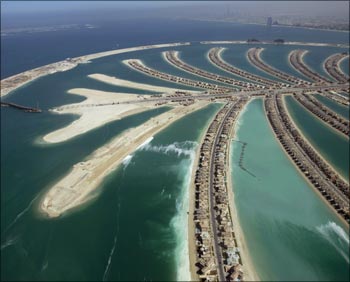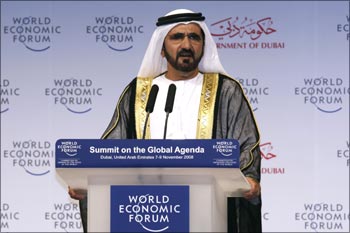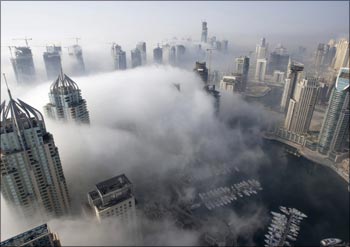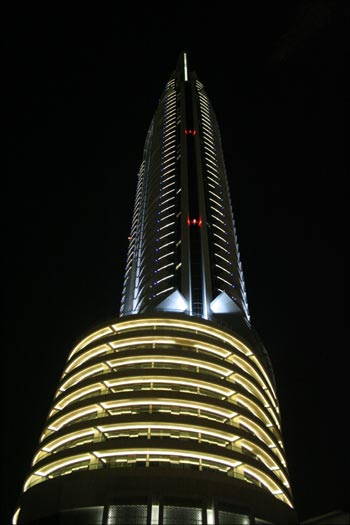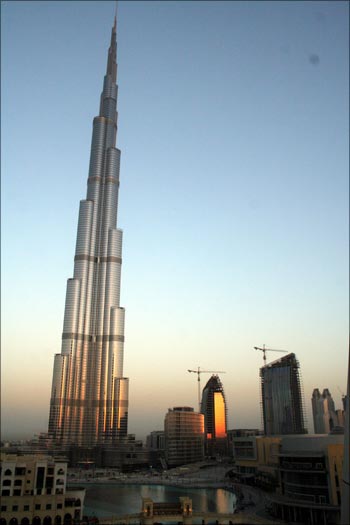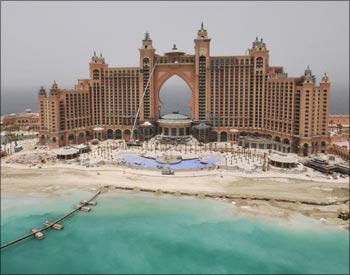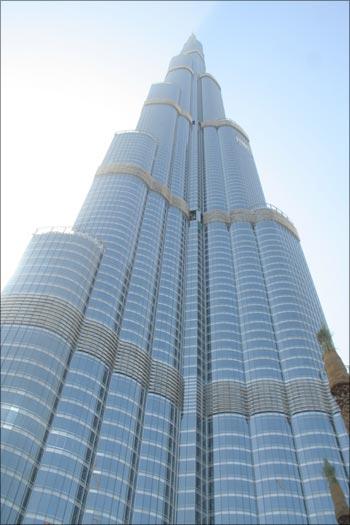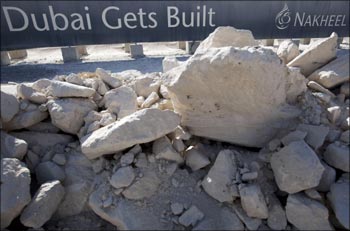 | « Back to article | Print this article |
Dubai shock! Why it happened, how it hits India
Just three days before Eid, the Dubai government's announcement seeking a six-month reprieve on debt repayments sent shockwaves through the world markets, as it raised doubts over the Gulf emirate's ability to meet its financial obligations.
Global markets, which have yet to come out of the financial crisis that savaged many an economy, reacted sharply and sank like a rock. Analysts now wonder whether they are witnessing the beginning of the biggest sovereign default since Argentina in 2001.
Questions are also being raised on Dubai's status as a major destination for international investment.
What happened was that the Dubai government requested the creditors of Dubai World (one of three conglomerates that are backed by the emirate), to agree to a 'standstill' on repayments until May 30 2010.
The standstill also applies to the $4.05 billion sukuk, or Islamic bond, issued by Nakheel, the state-owned builder famous for the spectacular Palm Jumeirah scheme and other such mind boggling projects that involve large-scale land reclamation. Nakheel's parent company is Dubai World.
The truth is that Dubai is being crushed under a mountain of debt. The emirate has chalked up debt in excess of $80 billion by expanding in banking, real estate and transportation. Dubai World with $60 billion liabilities has sought a six-month standstill on its debt repayment to all its lenders.
So how will this affect India and why did the crisis happen? Click NEXT to read on further. . .
Dubai shock! Why it happened, how it hits India
The emirate borrowed $80 billion in a four-year construction boom that transformed Dubai into a glittering jewel in the middle of the Gulf region and also into a tourism and financial hotspot.
Dubai's sovereign credit default swap has surged 1.11 per cent to 4.29 per cent, leading to global rating agency Standard & Poor's placing the ratings of four Dubai-based banks on negative outlook due to their exposure to Dubai World.
The debt itself might not seem too high, but the uncertainty surrounding the entire issue has spooked financier. Investor confidence the world over has been shaken up badly, as many wonder if the world would slip into another recessionary phase, given that there are some other nations in a similar situation as Dubai: Greece, Iceland, Hungary being just a few of them. Many nations that are following Dubai's development pattern are inviting trouble, said analysts. Economists fear that they might have been too hasty in predicting that the global financial crisis had ended.
The Dubai shock was as severe as it was sudden. Just a few weeks ago, Dubai's ruler Sheikh Mohammed bin Rashid al-Maktoum, had assured all that the emirate's financial condition was all right, saying that it would raise more funds to meet its financial commitments and would be more cautious.
As is normally the case in autocratic regimes like Dubai, no one knew what the real situation was till it was too late. Analysts feel that either the ruler was unaware of the magnitude of the problem or his advisors asked him to keep it under the wraps.
'The Sun Never Sets on Dubai World' is the corporate slogan of Dubai World. However, that may no longer hold true.
The proposal by the Dubai World, a state controlled enterprise, to restructure its debt portfolio has taken the markets by surprise and is being viewed as a prospective quasi-sovereign default. It appears that debt restricting will go through, at least partially with the GCC based banks, but one has to wait and watch as to how the international banks will respond to this offer.
The general expectation is that the Government of UAE will come out with a strong intent / statement of support for Dubai and its related business, which can then arrest the possible sell off that one can expect before the markets open on Monday.
Dubai shock! Why it happened, how it hits India
With Dubai World teetering on the brink of collapse, those who had invested heavily into the emirate believed that the conglomerate's bankers would extend it more loans to bail it out rather than let is reputation be dented.
However, with neither the bankers nor the emirate itself making any such supportive moves, it became clear that the emirate was in big trouble and it might be a while before it extricates itself from the morass.
Dubai also does not have the oil reserves, like its neighbours in the Persian Gulf, to help it tide over its financial woes.
The moment the truth dawned upon the markets, a chain of events unfolded: gossip spread through the world like wildfire hitting the emirate's property prices, credit rating agencies downgraded all Dubai government-related debt, billions of dollars were lost by investors as the value of their investments in the Gulf emirate plummeted, oil prices began to fall, some currencies saw a steep slide, and the stock markets the world over were revisited by that all-too-familiar sinking feeling. Billions of dollars of investor wealth was wiped out before anyone could blink.
Dubai saw property prices falling by almost 50 per cent from their 2008 peak. The property bubble had already begun to burst, but with this latest shock real estate will be devalued even more.
Dubai shock! Why it happened, how it hits India
The magnificent complexes built by Dubai's developers have turned this land of sand in to a global playground for the rich and mighty. Everyone who is someone globally has poured money into the extraordinary and lavish developments in Dubai.
The remarkable Palm Jumeirah, man-made islands reclaimed from and enveloped by the sea, boasts of a global who's who as its investors. Owners of these exclusive and expensive villas include the likes of Bollywood megastar Shah Rukh Khan, footballer David Beckham, Hollywood heartthrobs Brad Pitt and Denzel Washington, Afghan President Hamid Karzai, super model Naomi Campbell, and many shipping magnates, oil barons, and tech billionaires.
Dubai had raised $10 billion from Abu Dhabi, its wealthier neighbour, in February. And hours before it requested a standstill, it said it had raised another $5 billion from two Abu Dhabi banks, although only a portion of that was available immediately.
Unlike Abu Dhabi, Dubai has to borrow to finance its future. As the recovery takes hold, it will make money again from its property, tourism, trade and financial industries.
Dubai shock! Why it happened, how it hits India
World stocks plummet
The Indian stockmarkets joined the tumble in bourses around the world Dubai World, which manages that country's portfolio of businesses, expressed its inability to pay off its debtors now and wanted more time.
The Dubai stock market will reopen only on Monday.
The Bombay Stock Exchange's Sensex sank 600 points during mid-market trades.
The Indian rupee dropped further by 46 paisa to 46.90 against the greenback on persistent demand for dollar from oil companies amid sharp fall in equity market.
Other world stocks too slumped as the Dubai-debt shockwaves reached their shores, shaking banking shares and pushing yen to a fresh 14-year high against struggling dollar as investors unwound risky trades.
Dubai shock! Why it happened, how it hits India
Oil prices extended their decline from the previous day to fall below $76 a barrel on Friday, as nervous investors, roiled by debt problems in Dubai, pared their positions.
However, many say that it might be too early to write Dubai off. Its oil-rich neighbour Abu Dhabi will bail it out to some extent.
However, Indian bankers and economists say that the Dubai debacle would not have much of an impact on India as Indian banks do not have much exposure to the Dubai real estate markets.
Dubai concerns not to impact India, says Sharma
Notwithstanding the UAE being India's top destination for exports, the government put up a brave face stating financial concerns in Dubai would not impact the Indian economy and the country's real estate sector.
"I don't think," said Commerce and Industry Minister Anand Sharma when asked whether the confidence erosion in Dubai would have ripple effect in India.
Dubai shock! Why it happened, how it hits India
Sharma said the Indian economy is large and "I don't think developments in real estate sector in Dubai are going to impact it. Besides, the Indian real estate is doing well," he said.
The UAE, which has a large Indian population, is the country's largest export destination with shipments of about $24 billion in fiscal 2008-09.
Asked whether exports to the Middle East could be impacted, Sharma told reporters, "I hope not."
ICICI Bank says no material exposure to Dubai corporates
Amid fears of a debt crisis in Dubai, ICICI Bank on Friday said it does not have any significant exposure to Dubai corporates.
"ICICI Bank has no material, non-India linked exposure to Dubai corporates," an ICICI Bank spokesperson told PTI.
Dubai shock! Why it happened, how it hits India
As such, questions pertaining to any losses to the bank due to the imminent crisis in Dubai do not arise. Delhi-based Oriental Bank of Commerce also said the bank does not have any exposure in Dubai.
"We have no exposure there," OBC Executive Director S C Sinha said.
'Crisis may not impact remittances'
The Indian finance ministry meanwhile said the financial crisis in Dubai, triggered by a slump in real estate, may not impact remittances sent by Indian expatriates in the Gulf.
"Remittances from expats didn't suffer during the period when the larger crisis was on. So whether this should have an impact in terms of employment, in terms of salaries and therefore in terms of remittances is somewhat unlikely," Finance Secretary Ashok Chawla said.
India gets nearly a quarter of its total remittances from the United Arab Emirates.
Former RBI Governor Y V Reddy said, "On the basis of past evidence, the recent development in the Middle East should not have any serious impact on the Indian remittances."
Dubai shock! Why it happened, how it hits India
Chawla, however, said it will take some time for the Finance Ministry to examine the exact impact of the crisis on the Indian economy.
"We have seen the press reports. We will have to study what the issue is, what the problem is and what will be the possible implications, if any for the Indian economy, on the people, on the corporates. It will take some time for us to examine this," Chawla said.
Just a year after the global downturn derailed Dubai's explosive growth, the city is now swamped in debt.
There are fears that Dubai's conglomerate, Dubai World , may default on its around $59 billion debt and is seeking postponement of the debt until at least May because of the crisis triggered by real estate slump.
Dubai, which borrowed hugely, in a real estate boom, suffered due to slump in real estate following the global recession.
Dubai is one of seven city states that make up the United Arab Emirates, along with Abu Dhabi, the capital.
Dubai shock! Why it happened, how it hits India
RBI studying Dubai World default impact
The Reserve Bank India said it is examining the impact of the Dubai government's decision to suspend debt payments by Dubai World, which led global stock markets to tumble amid fears of widespread default.
Governor Duvvuri Subbarao said he has asked his officials to study the impact and "if necessary make recommendations."
"We shouldn't react to instant news like this. One lesson that we learnt from the (global financial) crisis is that we must study the developments and measure the extent of the problem and hence study the impact on India," said Subbarao, who attended an interactive session with the students of Indian School of Business in Hyderabad.
Meanwhile, N Chandrasekharan, CEO and MD, Tata Consultancy Services, said it did not have much exposure to Dubai markets and so impact if any is negligible.
